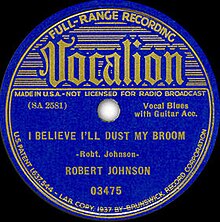Dust My Broom
| "I Believe I'll Dust My Broom" | ||||
|---|---|---|---|---|
 |
||||
| Single by Robert Johnson | ||||
| B-side | "Dead Shrimp Blues" | |||
| Released | April 1937 | |||
| Format | 10-inch 78 rpm record | |||
| Recorded | November 23, 1936 | |||
| Studio | Gunter Hotel, San Antonio, Texas | |||
| Genre | Blues | |||
| Length | 2:58 | |||
| Label | Vocalion | |||
| Writer(s) | Robert Johnson | |||
| Producer(s) | Don Law | |||
| Robert Johnson singles chronology | ||||
|
||||
| "Dust My Broom (I Believe My Time Ain't Long)" | |
|---|---|
 |
|
| Single by Elmore James | |
| B-side | "Catfish Blues" (performed by Bobo Thomas) |
| Released | 1951 |
| Format | 10-inch 78 rpm record |
| Recorded | August 5, 1951 |
| Studio | Ivan Scott's Radio Service Studio, Jackson, Mississippi |
| Genre | Blues |
| Length | 2:42 |
| Label | Trumpet |
| Writer(s) | Elmore James |
| Producer(s) | Lillian McMurry |
"Dust My Broom" is a blues song originally recorded as "I Believe I'll Dust My Broom" by American blues artist Robert Johnson in 1936. It is a solo performance in the Delta blues-style with Johnson's vocal accompanied by his acoustic guitar. As with many of his songs, it is based on earlier blues songs, the earliest of which has been identified as "I Believe I'll Make a Change", recorded by the Sparks brothers as "Pinetop and Lindberg" in 1932. Johnson's guitar work features an early use of a boogie rhythm pattern, which is seen as a major innovation, as well as a repeating triplets figure. "I Believe I'll Dust My Broom" was issued before blues records were tracked by recording industry trade publications and, as with most of Johnson's recordings, has not been otherwise identified as a big seller at the time.
However, Elmore James' 1951 recording as "Dust My Broom" "made it the classic as we know it", according to blues historian Gerard Herzhaft. James' slide guitar adaptation of Johnson's triplet figure has been identified as one of the most famous blues guitar riffs and has inspired many rock performers. The song has become a blues standard, with numerous renditions by a variety of musicians. It also has been selected for the Blues Foundation Blues Hall of Fame, the Grammy Hall of Fame, and the Library of Congress' National Recording Registry.
Elements of "Dust My Broom" have been traced back to several earlier blues songs. Blues researcher-writer Edward Komara has suggested that Johnson may have begun developing his version as early as 1933. The Sparks brothers' 1932 recording of "I Believe I'll Make A Change" and Jack Kelly's "Believe I'll Go Back Home" in 1933 both use a similar melody and lyrics. Some verses are also found in Carl Rafferty's 1933 "Mr. Carl's Blues":
I do believe, I do believe I'll dust my broom (2×)
And after I dust my broom, anyone may have my room ...
I'm goin' to call up in China, just to see if my baby's over there (2×)
I'll always believe, my babe's in the world somewhere
...
Wikipedia
